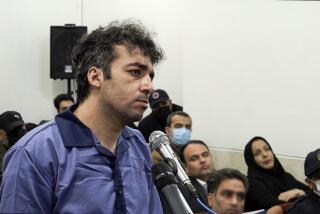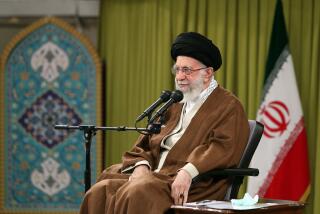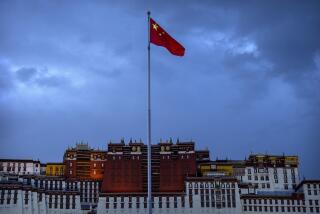Tibetans’ Death Penalties Upheld
- Share via
BEIJING — A Chinese court on Sunday upheld the suspended death sentence of an influential Tibetan cleric and the death sentence of an associate who were convicted in a string of bombings in western China.
The case has raised an outcry from Chinese intellectuals and Tibetan groups in exile and prompted expressions of concern from the U.S. government.
The Sichuan Province High People’s Court rejected the appeal of Tenzin Deleg Rinpoche, 52, who was given a suspended death sentence last month. It also upheld the death sentence of Lobsang Dhondup, 28, who did not appeal, the official New China News Agency reported.
Lobsang Dhondup was immediately executed, said an official at the Intermediate People’s Court in Ganzi, a city in Sichuan. As for Tenzin Deleg Rinpoche, death sentences with a reprieve are usually commuted to life imprisonment.
The government charged the two men in five bombings between January 2001 and last April. It said one explosion -- in a central square in Chengdu, the provincial capital -- killed a bystander and injured several others. Pro-Tibetan independence leaflets were found in the area, and both men also were convicted of inciting separatism.
Since the Sept. 11 attacks on the U.S., Beijing has tried to link ethnic separatist movements in China with terrorism. In the western region of Xinjiang, China in recent years has executed Muslim rebels convicted of bombings, but this appears to be the first such case involving Tibetans.
Communist troops took control of Tibet in 1950, and armed resistance to Chinese rule largely died out after an uprising failed in 1959 and the Tibetan leader, the Dalai Lama, fled to India.
Tenzin Deleg Rinpoche is one of several popular religious leaders in Ganzi prefecture. They are charismatic figures who have built institutions in Ganzi to promote Tibetan culture and Buddhism. Tibetan and human rights groups allege that local officials are trying to stamp out their influence in the region.
Tenzin Deleg traveled to India in the 1980s, where the Dalai Lama recognized him as a Rinpoche, or the reincarnation of a high-ranking Tibetan priest. Tibetans accepted the designation, but Ganzi authorities have refused to call him a Rinpoche.
Ganzi prefecture is a remote region on the eastern edge of the Tibetan plateau. The prefecture’s policies toward its majority Tibetans were considered more lenient than those in Tibet proper, but observers note that these policies have become more severe in recent years.
In a rare move, several prominent Chinese intellectuals and authors petitioned the government last month to handle Tenzin Deleg Rinpoche and his co-defendant fairly. The group pointed out that Ganzi authorities had conducted a public campaign to discredit the cleric before his trial in December.
In the top story of its Aug. 10 edition, the official Ganzi daily wrote: “The criminal group headed by Tenzin Deleg is a secret organization planted in our prefecture by the Dalai Lama clique to carry out separatist and sabotage activities.”
The intellectuals also asked the government to allow them to hire a lawyer for the two bombing suspects and permit outside observers and foreign media to observe the trial.
But the trial was closed to the public, the New China News Agency reported, because “some of the defendants’ criminal acts were related to state secrets.”
The report said the two had confessed to the crimes. But U.S.-funded Radio Free Asia recently aired what it said was a recording Tenzin Deleg Rinpoche made from prison Jan. 18.
“Whatever [the authorities] do and say, I am completely innocent,” the message said. “I have always urged people to be kindhearted and caring.”
During human rights talks in Beijing last month, U.S. Assistant Secretary of State Lorne Craner expressed concern about the fairness of the trials and the severity of the sentences.
More to Read
Sign up for Essential California
The most important California stories and recommendations in your inbox every morning.
You may occasionally receive promotional content from the Los Angeles Times.













